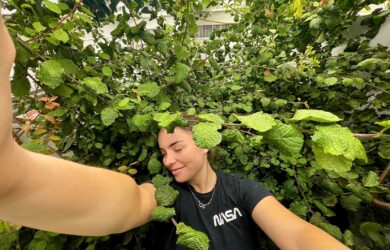
Three Gates Cambridge Scholars will join a host of Cambridge academics who will be speaking at this year’s Hay Festival.
Three Gates Cambridge Scholars will join a hosto of Cambridge academics who will be speaking on subjects ranging from hate speech, torture and the battle of Waterloo to global health innovation and pandemic flu research at this year’s Hay Festival.
The Cambridge Series has been running for seven years at the prestigious Festival and is part of the University’s commitment to public engagement. The Festival runs from 21st to 31st May and is now open for bookings.
This year's line-up includes a Gates Cambridge event on global health innovation with two current Scholars – Divya Venkatesh [2011] and Alexandra Grigore [2012] – and alumna Julia Fan Li, director of the Global Health Investment Fund. Julia Fan Li [2008] will speak about the GHIF, which funds research and development for some of the most pressing global health challenges; Divya will speak about her research on African sleeping sickness and cross disciplinary work in biotechnology; and Alexandra will describe her role in creating SimPrints, an innovative fingerprint identity system for accessing medical records in developing countries.
Other speakers in the Series include Dame Carol Black, Expert Adviser to the Department of Health, Chair of Nuffield Trust and Principal of Newnham College on wellbeing at work, Usha Goswami, Director of the Centre for Neuroscience in Education, on dyslexia and Professor Susan Golombok, Director of the Centre for Family Research, on modern families.
There will be a series of debates including a discussion of positive collaboration between India and Pakistan by members of the Centre of South Asian Studies, celebrating its 50th anniversary and a conversation on literary fiction in the age of information with leading novelists Deborah Levy and Nicola Barker, chaired by Malachi McIntosh from the Faculty of English.
Other speakers include Hannah Critchlow will speak about neuroscience myths, Professor Robert Tombs will discuss Englishness;David Bainbridge will debate the power of female body shape; Professor Matthew Kramer will speak about torture and morality; Professor Derek Smith will discuss his pandemic flu research; Professor Simon Szreter will talk about welfare politics; Professor Gareth Stedman Jones will discuss 20th century political authoritarianism and Professor Rae Langton will ask whether bad speech can always be fought with good.
James Clackson will discuss what we can learn from the ancient Romans and Greeks about the impact of migration on language and how this is relevant to contemporary concerns about immigration and language change. Professor Brendan Simms, author of The Longest Afternoon: the 400 men who decided the battle of Waterloo, will ask whether it was really the Germans won the battle of Waterloo and Professor Rosamond McKitterick will discuss Charlemagne, Rome and the management of sacred space.
Professor Dominic Lieven will discuss his new book Towards the flame: empire, war and the end of Tsarist Russia. It details how the Russian decision to mobilise in July 1914 may have been the single most catastrophic choice of the modern era. Esther-Miriam Wagner will talk about how language shapes our identity and Professor Hans Van de Ven will discuss China's D-Day: The Ichigo Offensive of 1944 and its impact on Asia.
Also taking part in the Festival from the University of Cambridge are Professor Steve Evans, Director of Research in Industrial Sustainability, and Professor Nicky Clayton who will be speaking about her collaboration with author Clive Wilkins on ‘The Moustachio Quartet’ which explores mental time travel.
Peter Florence, director of the Hay Festival, said: "Cambridge University nurtures and challenges the world's greatest minds, and offers the deepest understanding of the most intractable problems and the most thrilling opportunities. And for one week a year they bring that thinking to a field in Wales and share it with everyone. That's a wonderful gift."
Nicola Buckley, head of public engagement at the University of Cambridge, said: “The Cambridge series is a fantastic way to share fascinating research from the University with the public. The Hay Festival draws an international cross-section of people, from policy makers to prospective university students. We have found that Hay audiences are highly interested in the diversity of Cambridge speakers, and ask some great questions. We look forward to another wonderful series of speakers, with talks and debates covering so many areas of research and key ideas emerging from Cambridge, relevant to key issues faced globally today."
For tickets, go to: www.hayfestival.org
Full a full listing of the series and further information on booking, click here.












